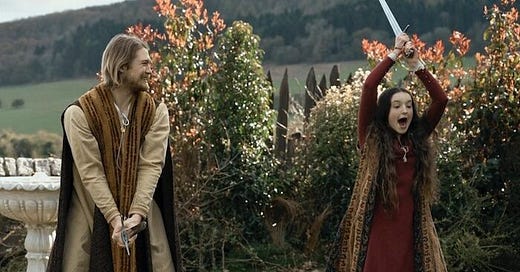Catherine Called Birdy
A fun but heartfelt look at the challenges of a woman and finding one’s own place in the world.
Like most film adaptations of novels set in the medieval or Victorian era, “Catherine Called Birdy” — based on Karen Cushman’s 1994 novel—seeks to bring the story of Catherine, played by Bella Ramsey, to modern audiences. We follow Catherine, who goes affectionately by the nickname Birdy, as she attempts to derail her parents’ intentions of marrying her off to a wealthy suitor in order to improve their financial situation.
Unlike other film adaptations, this one possesses a certain quality of authenticity that others typically shy away from. Our protagonist is painted neither as demure nor with an unimpeachable character, in fact it is her shortcomings and rough-around-the-edges-ness that make her such a relatable and enjoyable character.
Her apparent reluctance to marry and detestation of the expectations placed on women is portrayed in a humorous yet realistic light. Although director Lena Dunham is at times a touch heavy handed with this message, she does manage to effectively convey how fearful these expectations must have seemed to young women at the time.
The hijinks that ensue as result of her attempting to drive off unappealing, and frankly too old, suitors allow Ramsey to be seen as the heart and soul of this film. She does a remarkable and enthralling job of bringing the character of Catherine to life by giving both a funny and compelling performance.
Though the film is primarily a slice of medieval life comedy for the majority of the runtime, Ramsey manages to provide the more dramatic moments with a sense of gravity befitting of the character’s age and stage of life. This element of her performance allows the audience to understand the rather adult circumstances in which she has been placed through the eyes of a fourteen year old, a little less than half way between childhood and young adulthood.
The supporting cast also does a great job of creating a backdrop for and fleshing out the main character. One of the most compelling performances comes from Andrew Scott who plays Lord Rollo, Birdy’s father. Scott does an admirable job striking the balance between comedic timing and desperation, which provides context to the plight of the main character.
The film’s dialogue is undoubtedly one of its most notable attributes. Providing audiences with lines such as, “I am dying. It is plain to see,” when Catherine gets her first period. With writing such as this it comes as no surprise that the film is intended to successfully bridge the gap between a bygone era and the modern one.
This element of hilarity within the dialogue brings a sense of levity and relatability to what could easily be construed as a somewhat horrifying situation, while simultaneously allowing the audience to see the absurdity of it all. Unlike those around her who tend to accept rather than challenge their circumstances, Catherine is straightforward and brazen in her approach to everything from navigating the trials of growing up to her downright refusal to be married before she is ready.
Birdy herself narrates the film and assists the audience in keeping track of how much time has passed through the medium of a diary, given to her by her older brother who has chosen to become a monk, likely to escape the chaos of attempting to marry in such a society. While this is certainly not the first instance of diary narration as a storytelling device, in this instance it is surprisingly refreshing when done from the perspective of a fourteen year old, adding to the sense of levity created by the film’s tone.
However, providing such a youthful voice as narrator also allows for a much more critical look at adulthood and its implications during this era. Many of the other characters throughout the film view marriage as means of survival, thus making it something to be done out of necessity rather than by choice or for love, and adopt a “grin and bear it” attitude when it comes to being married for these superficial reasons or are forced into silent acceptance if they voice their disapproval.
This is best exemplified by Birdy’s uncle and best friend who each are placed into less than satisfactory marriages and must grapple with the consequences, although by the film’s end at least one of them manages to escape that dreadful fate.
“Catherine Called Birdy” is ultimately a fun and boisterous exploration of what it means to grow into a woman, both then and now. The soundtrack that accompanies the film highlights this theme with new and creative versions of songs such as, “My Boyfriend’s Back,” and “Fade Into You,” that exemplify the themes at play.
This free-spirited romp looks at happiness as something to strive toward rather than waiting for it to find you, and serves as a reminder of the importance of giving the ones you love the freedom to find themselves.





